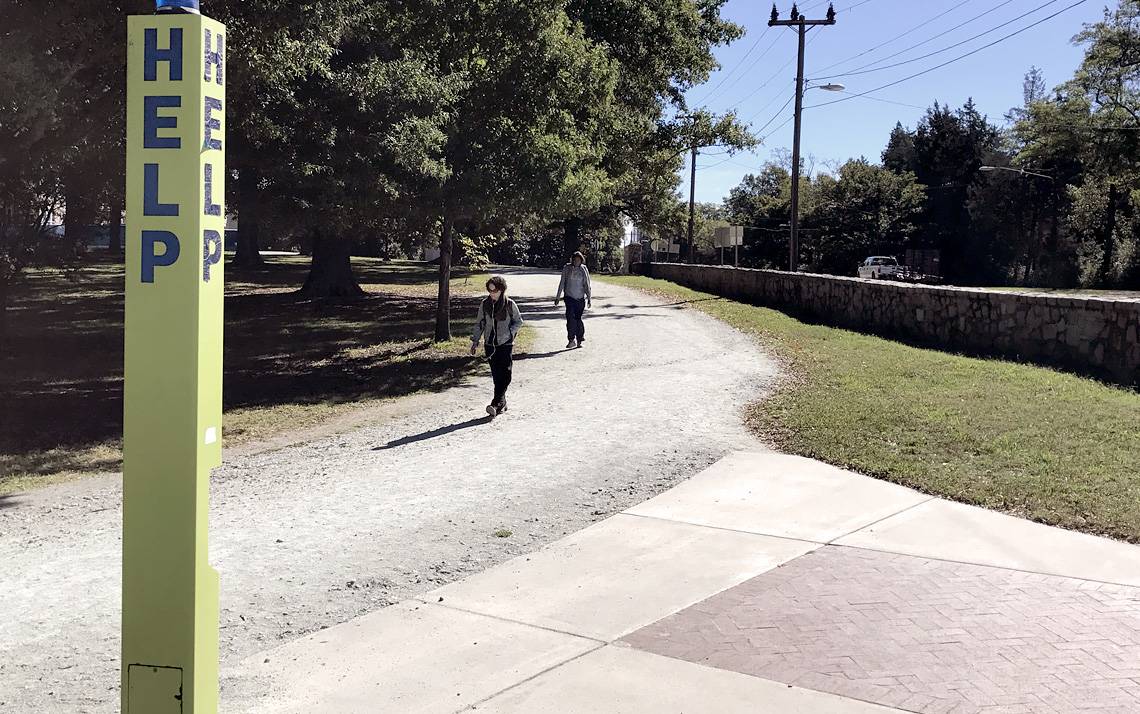5 Holiday Crime Prevention Tips
Duke experts offer advice on how to shop safely, travel smart and protect yourself

Whether it’s the dark evenings, the distracted shoppers, the out-of-town travel or the burst of online commerce, the holiday season often sees a slight uptick in property crime. Duke’s safety experts offered some steps you can take to make sure you don’t become a victim.
“The thing about crime is, you don’t think it’s going to happen to you until it does,” said Duke Police Crime Prevention Specialist Eric Hester.
Park Smart
Despite cameras and security staff keeping watch on Duke’s parking lots, car break-ins remain a constant concern. Hester said there are simple measures that can be taken to help prevent them.
If you leave anything of value in your car, don’t leave it in plain sight. Hester said that covering it with a coat or stashing it under a seat isn’t as clever as you might think. He said the way to truly keep would-be thieves from spotting your things is to lock them in the trunk.
Also, don’t forget to lock your car. While locking your car is an easy step, Hester pointed out that, since the majority of car break-ins happen to unlocked cars, not everyone does it.
“People say that that’s a no-brainer, but we see how many cars that are broken into that are unforced entries,” Hester said.
Protect your Packages
According to data from the National Retail Federation, 122 million Americans bought something online over Thanksgiving weekend. With holiday shopping moving increasingly online, packages on doorsteps are a common sight this time of year.
Hester said it’s best to keep them from being there too long as thieves often target unattended packages.
“It’s not uncommon, especially this time of year,” Hester said. “It’s an easy pick. Most of the time, people aren’t home and it gets dark early.”
If possible, Hester recommends asking a trusted neighbor to retrieve the package once it arrives. Instructing the shippers not to leave the packages without having someone sign for them is also a smart step. He also recommends having them shipped to the post office, where they can be kept until you can pick them up.
It’s also important to track your packages in order to keep them from being left unattended for long stretches.
If You Leave Town
The U.S. Department of Transportation reports that the number of car trips Americans take of 50 miles or more increases by 23 percent around Christmas and New Year’s Day.
If you’ve got a trip planned, Hester offered some simple moves to make your home less inviting for criminals.
“If you go out of town, set up timers for lighting around your house and notify a trusted neighbor,” Hester said.
Spend Safely Online
With an increase in online commerce this year, Richard Biever, Duke’s chief information security officer, offers some helpful tips on how to stay safe online.
Don’t use public Wi-Fi to shop. Public Wi-Fi systems are fine for browsing, but avoid making financial transactions on them.
Also, choose familiar online retailers. See if the website has a legitimate mailing address and phone number. You can also look for the padlock symbol next to the website’s URL. Double-click on the icon for the website’s certificate information. Make sure the certificate is current and displays the name of the company the website says you should be visiting.
If you choose to donate to charity, research the charity and donate directly to the organization’s website.
“This time of year, while we’re focused on the holiday, shopping, spending time with families and donating to charity organizations, it’s important to be aware of the risks we face online as well,” Biever said. “Be especially wary about the potential for identity theft and take precautions to protect yourself, your data and your purchases.”
Secure Your Devices
It’s always smart to make sure your devices are protected against malware and viruses by installing the latest updates and running up-to-date anti-virus software. Duke’s Office of Information Technology offers free anti-virus resources for Duke students, staff and faculty.
It’s also wise to make sure they’re protected in case they get stolen or misplaced. Duke OIT recommends installing Prey, an anti-theft software program that works for laptops, phone and tablets. It can help alert and locate devices if they are lost or stolen.
There are also programs that can remotely wipe devices if they’re lost or stolen, thereby protecting you data.